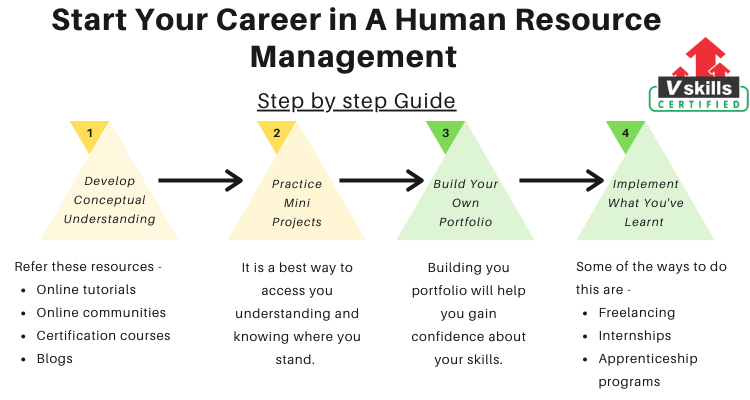Any business is critically dependent on the quality of its people, and an HR manager’s role becomes increasingly important. Knowledge in human resource management involves analyzing company’s Human Resources needs & various areas in HRM which includes basic knowledge of HRM, recruitment of right resources, their training and development and career progression.
Let us analyze the career prospects in Human Resource Management.
What is Human Resource Management?
Human Resource management is a process of recruitment, selection of staff, orientation, training and development, assessment of employees’ performing habits, determination of compensation and benefit provision, motivation of employees, good working relations with their employees and trade unions, safety, welfares and health measures of employees in accordance with laws.
Importance of Human Resources
There is a human mind, commitment and man hours behind the creation of every good or service (working hours). Without human assistance, no product or service can be manufactured. Man is a basic resource for creating or constructing something. Each organization wants capable and qualified staff to make its organization competitive and competent.
HRM deals with the first M, that is, humanity, money, machinery, materials and methods among the five M’s of management. “people” is believed not to be so easy to handle in the five Ms. “Each man is different” and totally distinct from other M’s, inasmuch as men have the power to control other Ms. Although the others are either dead or abstract, they don’t have the ability to think and decide for themselves.
Why to study HRM?
Some of the benefits to study human resource management are –
- A company’s bottom line suffers from high employee turnover. Finding and training a potential candidate cost twice as much as a current employee’s salary. As a human resources specialist, you’ll be able to identify and recruit the best candidates for the job right away. Candidates should be thoroughly interviewed not only to ensure that they possess the necessary qualifications, but also to ensure that they are compatible with the company’s culture.
- Since workers have various personalities, lifestyles, and work ethic, workplace conflict is unavoidable. You’ll learn how to approach conflict in the workplace and how to overcome it when taking the human resource management course. You’ll also learn how to deal with the situation in the most professional manner possible.
- The role of assessing employee satisfaction is typically delegated to human resource professionals. You’ll learn how to set up polls, focus groups, and interview methods as a human resource management student to help you figure out whether or not your employees are happy.
- Performance management programs are developed by human resources departments. Candidates can easily get a job without the requisite qualifications and experience if an organization does not have a human resource specialist on staff. As a consequence, human resources are needed in every workplace.
How Can you start your career in Human Resource Management?
To be acceptable at something, it is critical to have a good start with appropriate assets and learning material. As a result, your first steps toward learning must be appropriate in order for you to be a pro in this field. Let’s take a look at some steps you can take to start your learning process –
Step 1 – Learn about the basics and Develop Conceptual understanding
It is critical to have a solid foundation before becoming an expert in any field. Even before you get your hands on the practical labs, you must have appropriate applied knowledge. Everyone has to start somewhere. If you want to build a successful career in this field, you must start small. You can take the help of following resources for getting complete knowledge and having a complete conceptual understanding –
- Firstly, Online Tutorials for Human Resource Management
- Also, Certification Courses from verified sources such as Vskills, Coursera, Udemy and so on.
- In addition, Online communities
- Moreover, Blogs and study material from experts in this field and many more.
Vskills also provide Online tutorials, certification courses and free practice tests for the same. You can check them out on our official site.
Step 2 – Practice Mini Projects
If you want to be successful, you must rehearse. It is also the best way to access ones understanding and know where you’re going in terms of putting the knowledge you have gained into procedure. When it comes to practical aspects such as implementing Human Resource Management in projects, having some experience can help you stand out from the crowd. Some of the certifications you can take for the same are –
- aPHR (Associate Professional in Human Resources)
- PHR (Professional in Human Resources) and
- SPHR (Senior Professional in Human Resources)
- GPHR (Global Professional in Human Resources)
You can supplement your learning with the help of reading the blogs and tutorials by various sites which will help you to grasp a better understanding of the practical aspects.
Step 3 – Build Your Portfolio
Building your portfolio will help you develop confidence in your skills as well as provide your learning platform. Your portfolio demonstrates your ability to implement and plan different codes, or how you perform your HRM skills impeccably. These duties should include a number of different data sets and allow readers to gather fascinating knowledge.
Step 4 – Implement your skills in Real world
Execution of the skill you have acquired is extremely important because this is why you learned – to perfectly execute the skill! You must also continue to update yourself and keep on working and developing your own skills with new technological advances. Some of the advance courses can also be used as evidence that you are well aware of advanced skills. Some of the ways through which you can implement your skills are –
- Freelancing
- Internships
- Apprenticeship programs
Above mentioned steps will help you to get started in this domain. However, there is a long way to go. You can take up an advanced course to take your skills to a new level.
Career Opportunities in Human Resources Management
Different roles where you can work are –
Arbitrator
Arbitrators are people who work in the field of alternative conflict resolution (or ADR). Arbitration is one of the mechanisms for settling civil conflicts outside of the judiciary and across international borders. Many individuals and companies do it on a voluntary basis, which means all parties must agree to abide by any final decision.
An arbitrator is a neutral third party who rules on a dispute based on the facts submitted by the parties. The arbitrator’s ruling is not always legally binding, but if it is, people and/or companies would not be allowed to appeal if they disagree with the result later.
Human Resource Officer
As an HR officer, the goal is to ensure that the company you work for hires the right mix of expertise and experience, and that employees have access to training and development opportunities to help them improve their performance and achieve the company’s goals.
Office Manager
As an office manager, you’ll be in charge of overseeing the administrative activities that help an office run smoothly, such as organizing people, information, and other resources. You’ll make sure the office equipment is kept in good working order, that relevant documents are kept up to date, and that all administrative processes run smoothly.
Occupational psychologist
As an occupational psychologist, you’ll apply psychological insight, theory, and experience to organizational problems such as culture and transition, as well as individual or team-level issues. Your goal is to increase the productivity of the organization and employee job satisfaction by focusing on employee performance and how people, groups, and organizations work. Ergonomics, staff management, and time management are all fields where the job intersects.
Training and development officer
Your role as a training and development officer is to provide employees with the expertise, practical skills, and inspiration they need to do their jobs well. You’ll take a holistic approach to training, evaluating an organization’s expertise and knowledge to determine what training is required to develop and maintain these abilities. You’ll either conduct the training yourself or hire a third-party instructor. Learning and growth officer/adviser, training officer/manager, and learning officer/manager are all names that can be used to advertise employment.
On the job responsibilities
Some of the on job responsibilities that you need to handle are –
- Plan and organize a company’s staff to make the most of its workers’ abilities.
- Link a company’s management with its staff.
- Employee benefit packages should be planned and overseen.
- Assist other administrators as a human resources consultant, advising them on topics such as equal employment opportunities and sexual harassment.
- Coordination and supervision of experts and support personnel’s jobs
- Oversee the recruiting, interview, selection, and hiring processes for a company.
- Handle problems with staffing, such as managing disagreements and directing disciplinary procedures.
Market demand for Human Resource Management
The global human resource management market was estimated at USD 16.01 billion in 2019, with a CAGR of 11.7 percent forecast from 2020 to 2027. The implementation of predictive analytics into HR processes, combined with advancements in IT, is expected to boost growth. With the advancement of numerous human resource management (HRM) solutions, professionals can now complete conventional HR tasks in less time, allowing them to concentrate more on recruiting the best candidates. It involves assisting in the retention of human capital, aligning organizational strategies with individual priorities, and managing human resources in a way that promotes organizational development.
Employment of human resources managers is projected to grow 6 percent over the next ten years, faster than the average for all occupations. As new companies form and organizations expand their operations, they will need human resources managers to administer and monitor their programs and to ensure that firms adhere to changing employment laws.
Average Salary
Human resources managers hold about 165,200 jobs. The largest employers of human resources managers are as follows:
| Professional, scientific, and technical services | 14% |
| Management of companies and enterprises | 14% |
| Manufacturing | 11% |
| Government | 9% |
| Healthcare and social assistance | 8% |
Human resources managers work in offices. Some managers, especially those working for organizations that have offices nationwide, must travel to visit other branches as well as to attend professional meetings or recruit employees.
Future of HRM
HR specialists are expected to take on the role of championship coaches by 2025, leading companies through anticipated disruptions and being an integral part of HR strategy and preparation. HR departments will also become more flexible, with better teamwork resulting in quicker decision-making. With so many significant improvements to make in less than five years, you must immediately revamp your HR role before it is too late!
Get started and discover the career opportunities in the field of Human Resource Management. Hurry up and try free practice tests now offered by Vskills.in!





